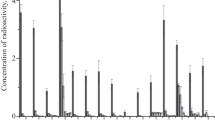Abstract
Prostate-specific membrane antigen (PSMA) is a biomarker for prostate cancer, which is commonly used in the development of diagnostic and therapeutic drugs for prostate cancer. In this study, rhenium-188 was chelated with mercaptoacetyltriglycine (MAG3)-PSMA to obtain 188Re-MAG3-PSMA. The labeling efficiency was greater than 99% under the optimal labeling conditions, and it was stable in saline and 10% FBS (fetal bovine serum) after 72 h of incubation. In cellular assays, uptake in PSMA (+) 22Rv1 cells was four-fold greater than that in PSMA (-) PC-3 cells. Biodistribution results revealed that the tumor-to-muscle ratio reached a maximum at 4 h after injection.







Similar content being viewed by others
References
Siegel RL et al (2021) Cancer statistics, 2021. CA 71(1):7–33
Li X, Zeng X (2021) Advances in epidemiology of prostate cancer in China. Cancer Res Prev Treat 48(1):98–102
Denmeade SR, Isaacs JT (2002) A history of prostate cancer treatment. Nat Rev Cancer 2(5):389–396
Park JC, Eisenberger MA (2015) Advances in the treatment of metastatic prostate cancer. Mayo Clin Proc 90(12):1719–1733
Heidenreich A et al (2013) Castration-resistant prostate cancer: where we stand in 2013 and what urologists should know. Eur Urol 64(2):260–265
Barrio M et al (2016) Prostate specific membrane antigen (PSMA) ligands for diagnosis and therapy of prostate cancer. Expert Rev Mol Diagn 16(11):1177–1188
Afshar-Oromieh A, Zechmann CM, Malcher A et al (2014) Comparison of PET imaging with a 68Ga-labelled PSMA ligand and 18F-choline-based PET/CT for the diagnosis of recurrent prostate cancer. Eur J Nucl Med Mol Imaging 41:11–20
Jia Z-Y et al (2008) Rhenium-188 labelled meso-tetrakis 3,4-bis (carboxymethyleneoxy) phenyl porphyrin for targeted radiotherapy: preliminary biological evaluation in mice. Eur J Nucl Med Mol Imaging 35(4):734–742
Juweid M et al (1998) Pharmacokinetics, dosimetry and toxicity of rhenium-188-labeled anti-carcinoembryonic antigen monoclonal antibody, MN-14, in gastrointestinal cancer. J Nucl Med 39(1):34–42
Miao Y, Owen NK, Fisher DR, Hoffman TJ, Quinn TP (2005) Therapeutic efficacy of a 188Re-labeled alpha-melanocyte-stimulating hormone peptide analog in murine and human melanoma-bearing mouse models. J Nucl Med 46(1):121–129
Nassar MY et al (2011) Synthesis of a Re-188-DTPMP complex using carrier-free Re-188 and study of its stability. J Radioanal Nucl Chem 287(3):779–785
Wang Y et al (2020) Radionuclide Re-188-loaded photothermal hydrogel for cancer theranostics. Part Part Syst Charact. https://doi.org/10.1002/ppsc.201900421
Hashimoto K (1998) Synthesis of a Re-188-HEDP complex using carrier-free Re-188 and study of its stability. Appl Radiat Isot 49(4):351–356
Lee C-H et al (2021) The feasibility of Cu-64-PSMA I&T PET for prostate cancer. Cancer Biother Radiopharma. https://doi.org/10.1089/cbr.2020.4189
Huang Y et al (2021) Synthesis and preclinical evaluation of an (AlF)-F-18 radiofluorinated bivalent PSMA ligand. Eur J Med Chem. https://doi.org/10.1016/j.ejmech.2021.113502
Benesova M et al (2015) Preclinical evaluation of a tailor-made DOTA-conjugated PSMA inhibitor with optimized linker moiety for imaging and endoradiotherapy of prostate cancer. J Nucl Med 56(6):914–920
Gorges TM et al (2016) Heterogeneous PSMA expression on circulating tumor cells—a potential basis for stratification and monitoring of PSMA-directed therapies in prostate cancer. Oncotarget 7(23):34930–34941
Acknowledgements
This study was funded by the National Natural Science Foundation of China (Grant No. 11705268).
Author information
Authors and Affiliations
Corresponding authors
Additional information
Publisher's Note
Springer Nature remains neutral with regard to jurisdictional claims in published maps and institutional affiliations.
Rights and permissions
About this article
Cite this article
Wang, H., Cai, L., He, SH. et al. Preliminary biological evaluation of rhenium-188-MAG3-PSMA. J Radioanal Nucl Chem 331, 2553–2559 (2022). https://doi.org/10.1007/s10967-022-08306-0
Received:
Accepted:
Published:
Issue Date:
DOI: https://doi.org/10.1007/s10967-022-08306-0




